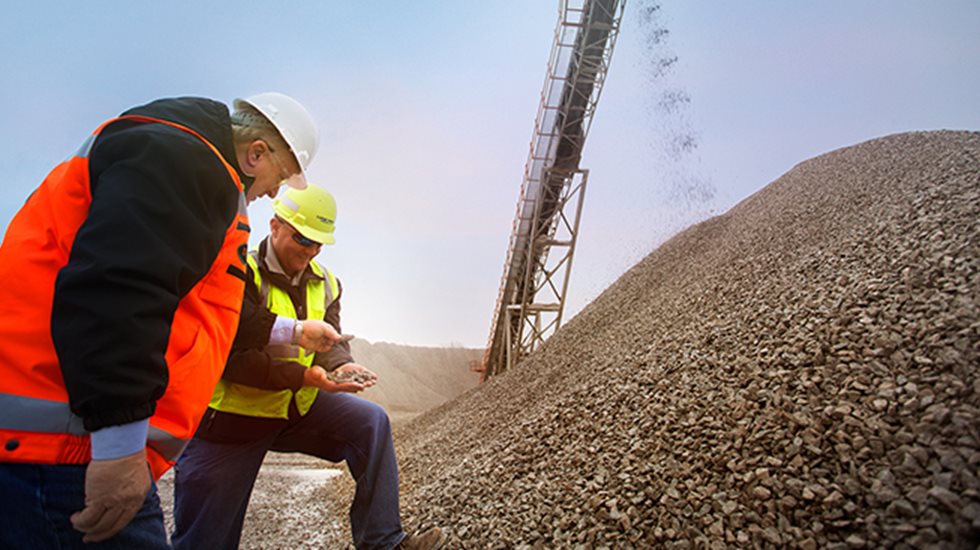Imagine 40 percent of your quarry's total electricity consumption going to just keeping the pit dry by pumping up ground water. This was the situation at Lehigh Hanson's Harding Street quarry in 2012. Considering all the crushing, screening and other energy-intensive processes going on at the same time, spending close to half of the electricity consumed at the Harding Street plant on water management was a big issue for Lehigh Hanson.
The Harding Street quarry is located in Indiana, United States. The quarry is situated over a big limestone deposit near residential and industrial areas, only 6 miles south of downtown Indianapolis. An overburden consisting of sand and gravel lies on top of a layer of commercial-grade limestone. The third and bottom layer of the deposit is state-grade limestone. The commercial-grade limestone qualifies as building material, whereas the state-quality product is mainly used in road construction and other infrastructure projects.
Excess water and substantial pumping costs
The White River surrounds the quarry's northern and western perimeters, posing unique challenges to production. Because the pit is located below the surface level of the White River, and sand and gravel form the 40-foot layer of overburden, ground water keeps seeping into the pit.
This complicates the utilization of the limestone deposit, making it more difficult to get to the bottom layer – the quarry's most valuable asset in the current market. Ever since the economic downturn hit the United States in 2008, demand for the commercial-grade product has slumped, making the lowermost deposit of state-grade limestone the best-selling product.
According to Randy Jones, Plant Manager at the Harding Street Quarry, excess water increases production costs in multiple ways.
"Even a little bit of water in the pit increases tire wear of the trucks driving back and forth in the pit. Wet rock increases both the trackback on the belts and the need for clean up. Also, dry rock crushes more easily than wet rock and is less demanding on the wear parts," he explains.
And then there are the pumping costs. To keep the bottom of the quarry dry, Lehigh Hanson has been operating five pumping stations, with some of the pumps located on the bottom of the pit – a massive 350 feet below surface level. It takes a lot of electricity to pump water all the way from the bottom of the pit to the top.
New eyes, fresh perspective
Lehigh Hanson and its parent company HeidelbergCement Group had embarked on a global operational improvement program called CLIMB, in 2011. Metso – a long-term partner of Lehigh Hanson – was the only supplier volunteering to participate in the initiative. During the program, Lehigh Hanson identified the Harding Street quarry as a big production site that was underperforming and invited Metso to take a look at the process.
The aim at Harding Street was to find ways to make the existing equipment work in today's market, keeping the amount of new investments required to a minimum.
Metso's Distribution Manager John Bennington and Regional Sales Manager Jeff Boone were ready to rise to the challenge. Together with Lehigh Hanson staff, they visited several sites, produced written reports of each visit and brought a fresh perspective to the project.
Metso focused on finding a solution to reduce the energy consumption in dewatering the quarry. The Metso team worked with Lehigh Hanson personnel to identify the location for a new pump at a higher altitude to help reduce the amount of pumping lift and to even eliminate some of the existing pumping stations. Metso's Jeff Boone helped Lehigh Hanson to pick the right-sized pump and select the optimum location for it. The design allowed for some overcapacity, enabling Lehigh Hanson to carry out the pumping during the night to take advantage of the lower cost of electricity and thus save money.
"With Metso's help, we were able to install a new sump on the south side, establish ditch lines, and get the water going to that sump, enabling us to pump the water from an elevation of 75 foot ahead versus 350 foot ahead. This has greatly reduced the number of hours the pumps are running," describes Randy Jones.
"The pumping solution has made a big difference and brought huge savings," he continues.
"The customer knows its own plant ten times better than Metso, but Metso knows ten times more plants than the customer," John Bennington sums up the benefits gained from bringing new eyes to the project.
Significant savings in both money and electricity
Thanks to the pumping solution, the Harding Street plant's annual electricity consumption dropped by approximately 2.1 kWh compared to 2011. At current electricity prices, this reduction in consumption translates to an annual saving of USD 175,000.
"We're also noticing additional savings in reduced tire wear from our loaders, from our trucks not having to run through the water in the pit, and by processing dry rock instead of wet rock," Randy Jones adds.
In addition, the Metso team found ways to improve the efficiency of the secondary crushing plant and helped Lehigh Hanson adjust the production to better meet current demand. These improvements have generated USD 109,000 in annual savings.
"Metso helped us to adjust our process to meet the current market situation," comments Ian Cross, Director of Benchmarking at Lehigh Hanson.
"One of the primary challenges at Harding Street was that the market had changed substantially since we installed the plant: a big drop in the volume and a big change in the product range. So one of the goals was to optimize the machinery to make exactly what the market demanded. Metso helped us tune the settings on the crushers and screens, for example," he explains.
The excellent results received also outside recognition in the summer of 2013, as the significant improvement in the quarry's energy efficiency helped it achieve the US Environmental Protection Agency's ENERGY STAR® Challenge for Industry.
